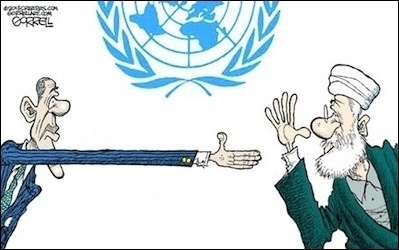Obama's
Syria Diplomacy is Doomed to Fail
by A.J. Caschetta
The Hill
January 22, 2016
|
|
|
Share:  
|
  Be the first of
your friends to like this. Be the first of
your friends to like this.
Originally published under the title "Syrian Diplomatic
Push Doomed to Fail."

The Obama administration will spend its final year attempting
"to de-escalate the conflict in Syria...through a political
transition." This effort to impose a diplomatic
solution on Syria will be lauded as a great success by the State
Department and recognized for the failure it is destined to be by nearly
everyone else. John Kerry may get his temporary cessation of killing, but
not of hostilities. He may reside over grave and haughty signing
ceremonies, but few of the parties will abide by the promises they make.
An admirable impulse to own the moral high ground, never "stoop
to the enemy's level" and exercise all diplomatic efforts before,
during, and after a war has taken hold of all levels of the US
government, but the results are often counterproductive.
Diplomacy only succeeds when backed by a credible threat of force, and
few believe that the U.S. will exert anything beyond the bare minimum in
Syria. The president has somehow failed to learn the most important piece
of advice Machiavelli gave to the prince – "it is better to be
feared than loved."
The United States has lost its
capacity to inspire fear.
|
In Syria the US lost its capacity to inspire fear in 2013 after Assad
was allowed to cross
with impunity Obama's "red
line" on the use of chemical weapons. Secretary of Defense Chuck
Hagel recognized the harm that would come from failure to follow through
on the threat, but his
advice to bomb Damascus was rebuked, leading to his departure from
the administration.
World War II was the last large-scale conflict to end in unconditional
surrender. With the advent of the United Nations, conflicts have ended
through diplomacy, which is to say that one side of a conflict has either
agreed to compromise, pretended to compromise or was forced to
compromise. Unless one side is defeated, or convinced that defeat is
inevitable, the conflict persists. The UN has become a great facilitator
of stalemates.
Any UN-imposed diplomatic intermission, like one
in late December between Assad and rebels allowing evacuation of
civilians from three towns, may offer the virtue of a temporary cessation
of violence, but diplomacy alone can never create peace. On rare
occasions when both sides of a dispute are willing to compromise, as in
the voluntary separation of Czechoslovakia into the Czech Republic and
Slovakia, peace can be authentic and lasting. More often though, one side
is unwilling to compromise, resulting in a situation like Korea, where
nearly 30,000
US troops have enforced a precarious peace for half a century.
Another model is Vietnam, where the Paris Peace Accords led to an agreement
that was breached even before the last US helicopter left Saigon. And
then there is Israel, capable but diplomatically unwilling to eliminate
the threat from its belligerent neighbors. The UN is able to create the
illusion of peace but unable to alter conditions that lead to war,
especially as in Syria where all the combatants are intransigent. Only
the U.S. wants an agreement, any agreement.
The Obama administration's
diplomatic efforts have everywhere been dismal.
|
In spite of great
expectations to the contrary, the Obama administration's diplomatic
efforts have been dismal, from its failure
to secure an effective Status of Forces agreement with the Iraqi
government (depicted by the press as a campaign promise kept) to its
obsequious JCPOA with Iran (depicted by the State Department as an
important breakthrough), thanking Iran for taking care of the U.S.
sailors they held hostage. It negotiated arguably the two worst prisoner
exchanges in the history of prisoner exchanges: five American citizens
held hostage for the crime of being American traded for seven convicted
criminals who happened to be Iranian. Before that it was five top Taliban
commanders traded for Pfc. Bowe Bergdahl – hailed
by Susan Rice in 2014 as "a young man...who served with honor
and distinction," charged
in 2015 with desertion and misbehavior before the enemy and facing
a General Court Martial in 2016. At a very strange Rose Garden
announcement with Bergdahl's very strange parents, Obama called
it "a good day." It wasn't.
Any UN-approved, John Kerry-led State Department initiative in Syria,
like the one Kerry announced in his January
13 speech to the National Defense University, will likely lead to
another bad day, with US enemies strengthened and US influence weakened.
Since none of the major parties currently has much cause to fear the US,
look for an emboldened Assad and increased Russian and Iranian influence.
Rather than the demise of ISIS, expect a further marginalization of the
Kurds and Israelis. For the next president's sake, for everyone's sake,
let's hope no one draws any more red lines.
A.J. Caschetta is a senior lecturer at the Rochester
Institute of Technology and a Shillman-Ginsburg fellow at the Middle East
Forum.
|































No comments:
Post a Comment